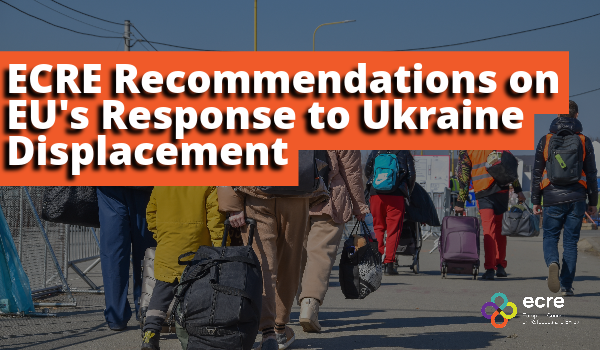ECRE’s new recommendations published on 10 October collates and updates earlier recommendations to the EU and its Member States. It draws on the work of ECRE’s members across Europe which are directly involved in the response, as well as on the findings of the AIDA Comparative Report providing an overview of access to socio-economic rights for temporary protection beneficiaries (TPBs).
ECRE’s assessment is that the EU’s response to displacement from Ukraine is largely positive, however, there are areas where changes can be made in order to better support displaced people and to ensure that asylum systems continue to function. Accordingly, ECRE calls on EU Member States (EUMS) to continue ensuring access to protection through the implementation of the Council Decision and following the Operational Guidelines to ensure uniform application across the EU. Specifically, ECRE draws attention to a number of challenges related to the implementation of the TPD in terms of access to socio-economic rights, which result from the limited capacities of states; existing complex administrative procedures; and, in some cases, a lack of equal access to rights compared to nationals or similar categories of legal residents in the states in question.
ECRE also underlines the need to maintain TP status for the whole duration of the TPD regime. ECRE notes that diverging policies on “pendular” movements of TP beneficiaries between EUMS and Ukraine may lead to premature withdrawal of the TP status and thus the suspension of related rights and benefits. ECRE also recommends responses for people fleeing Ukraine who are outside the scope of the TPD regime and for people fleeing Russia, many of whom are likely to be in need of international protection. Further, ECRE recommends a continued role for the EU Agencies, both in supporting access to territory and in ensuring protection in the EU.
In addition, ECRE stresses the need to develop longer-term options for current TP holders. Following the Council’s Decision to extend the TPD until March 2025, a broader interpretation of the TPD to enable its extension beyond March 2025 at least for another (fourth) supplementary year should be explored and introduced as soon as possible.
Overall, the TPD is an instrument of the Common European Asylum System (CEAS) so access to rights under the TPD should not be organised and implemented in a parallel system to that of other beneficiaries of international protection. In ECRE’s view, EUMS should invest in more efficient and humane asylum systems for all, through adequate resourcing and respect for legal obligations. Rather than developing a two-tier system, lessons from the Ukraine response should be applied to the asylum system as a whole.

